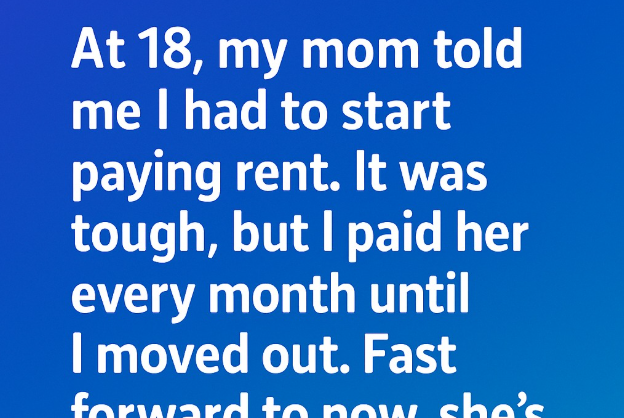At 18, my mom informed me that I needed to begin contributing rent. The requirement proved challenging, yet I handed over payment to her each month right up until the day I left home. Moving ahead to the present moment, she finds herself short on funds and expresses a desire to come live with me. I gave my approval, right until my younger brother offhandedly shared a detail that altered my entire perspective. He revealed that Mom had never required rent from him—not a single time—even though he stayed under her roof for a much longer period than I ever managed. A wave of bewilderment, irritation, and letdown swept through my thoughts.
For many years, I held the conviction that requiring rent served as her method for instilling a sense of duty. I took on evening work hours following classes, passed on gatherings with companions, and set aside every additional coin I earned. I assumed she acted with equity and readied me for the realities of grown-up life. Learning that my brother avoided those identical demands prompted me to reevaluate all my prior beliefs. Why did she impose the weight solely on my shoulders? Did she handle me differently due to my position as the eldest, or had she truly overlooked the impact on my emotions? Those inquiries remained present while I readied the space for her upcoming stay.
Reflecting on Past Experiences and Building Awareness
Before reaching any firm conclusions, I arranged a calm conversation with my mom and carefully inquired about those earlier times. She appeared taken aback, then reflective, prior to describing how, in that era, she faced hardships greater than I ever comprehended. The rent I provided assisted in maintaining electricity, purchasing food items, and handling unexpected situations she kept silent about. She clarified that she avoided charging my brother because, by his time at home, her finances had stabilized, and she preferred neither of us to experience any sense of compulsion. The difference stemmed from varying situations rather than any form of preference. Absorbing her candid explanation eased a deep-seated tension within me.
As she eventually settled into my home, the strain that once existed between us transformed into a serene mutual recognition. I came to see how people frequently hold onto childhood interpretations without seeking the actual facts. Mom possessed flaws, yet she managed with the resources available to her. The opportunity arrived for me to extend aid, driven by empathy rather than requirement. Living together once more highlighted that family bonds do not rely on flawless decisions—they gain strength through pardon, open dialogue, and the commitment to evolve as a unit.
Exploring the Depths of Family Dynamics
Family relationships often involve layers of complexity that unfold over time. In my case, the initial demand for rent at such a young age shaped my early views on independence and fairness. Many individuals encounter similar milestones where parents introduce financial contributions to teach valuable lessons. These experiences build character and prepare young adults for managing budgets, bills, and priorities. I recall the dedication required to balance schoolwork with part-time employment. Nights spent at a local diner or retail store became routine, all to ensure I met my monthly obligation. Friends invited me to movies or weekend trips, but I often declined to preserve my earnings. This discipline fostered a strong work ethic that benefits me to this day.
Parents navigate their own challenges while raising children. Economic pressures, job instability, or unexpected expenses can influence household rules. In our family, the years when I contributed coincided with tougher financial periods. Utility bills piled up, grocery costs rose, and repairs demanded attention. My contributions, though modest, provided essential relief. Mom handled these matters quietly, shielding us from worry. She focused on keeping the home stable, allowing my brother and me to concentrate on education and growth. Retrospectively, her approach demonstrated resourcefulness and sacrifice.
The Moment of Revelation and Its Impact
The conversation with my brother occurred during a casual family gathering. We discussed life updates, careers, and living arrangements. His remark about never paying rent slipped out naturally, without malice. At first, I processed the information silently. Memories flooded back: envelopes with cash handed over, discussions about due dates, and the pride in meeting expectations. Why the discrepancy? As the older sibling, I assumed greater responsibilities from an early age—chores, babysitting, setting examples. Perhaps Mom viewed me as more capable or ready for such lessons. Alternatively, timing played a key role, as her circumstances evolved.
Emotions surfaced gradually. Bewilderment led to irritation, then to a profound sense of letdown. Childhood perceptions of equity shattered. I pondered late into the night, replaying conversations and events. Sleep evaded me as I weighed options: confront immediately, ignore the issue, or seek clarity. Choosing the latter path aligned with my values of communication and respect. Scheduling a private talk required courage, but it promised resolution.
The Heartfelt Conversation That Changed Perspectives
We met in the living room, sunlight filtering through windows. I expressed my feelings calmly, focusing on facts rather than accusations. Mom listened attentively, her expression shifting from surprise to contemplation. She shared details previously unspoken: medical bills, vehicle breakdowns, reduced work hours. My rent bridged gaps during those lean months. By the time my brother reached adulthood, promotions and careful budgeting improved stability. She emphasized equal love for both children, with decisions tailored to needs at the moment.
This exchange fostered healing. Transparency dissolved resentment. I appreciated her vulnerability in admitting imperfections. Parents, like everyone, make choices under pressure. Her intent centered on family welfare, not division. We discussed boundaries for her move-in: shared chores, personal space, financial contributions if feasible. Agreement came easily, built on newfound trust.
Life Together: Lessons in Compassion and Growth
Her arrival brought routine adjustments. Mornings included shared coffee and conversations about daily plans. Evenings featured home-cooked meals, reviving old recipes. Laughter returned, replacing awkward silences. We attended local events, walked neighborhood paths, and tended a small garden. These activities strengthened our connection.
Living under one roof again revealed ongoing opportunities for learning. I observed her resilience in facing current financial hurdles—perhaps retirement savings shortfalls or rising costs. Offering support felt reciprocal, honoring her past efforts. Compassion guided interactions, free from score-keeping.
Broader Insights on Responsibility and Fairness
Responsibility manifests in varied forms across families. Some parents require contributions early; others delay until employment stabilizes. No universal approach exists, as each household adapts to unique conditions. Teaching financial literacy benefits long-term success. Skills like budgeting, saving, and prioritizing expenses prove invaluable.
Fairness does not always mean identical treatment. Siblings experience different eras within the same family. Economic shifts, health changes, or external factors influence rules. Recognizing this prevents unnecessary grudges. Open discussions clarify intentions and prevent misunderstandings.
Forgiveness as a Foundation for Stronger Bonds
Pardon mends relational fractures. Acknowledging human limitations allows progress. In our story, releasing past grievances enabled harmony. Mom’s honesty deserved reciprocity. I forgave perceived inequities, focusing on present unity.
Communication serves as the bridge to understanding. Regular check-ins address concerns promptly. Expressing needs and listening actively builds empathy. Families thrive when members feel heard and valued.
Commitment to Collective Evolution
Growth occurs through shared experiences. We committed to supporting one another—emotionally, practically, ongoing. Attending workshops on family dynamics or reading books on relationships enriched perspectives. Small steps yielded significant improvements.
Neighbors and friends noticed our positive changes. Inquiries about cohabitation tips arose frequently. Advice centered on patience, respect, and flexibility. Multi-generational homes offer benefits: companionship, cost-sharing, knowledge transfer.
Embracing Imperfection in Family Life
No family achieves perfection. Choices reflect available information and resources. Strength emerges from adapting, forgiving, and advancing together. Our journey illustrates this truth. From rent demands to welcoming Mom home, each phase contributed to deeper appreciation.
Today, gratitude fills our interactions. Challenges transformed into growth catalysts. Responsibility, once a burden, now represents mutual care. Understanding replaced confusion. Disappointment evolved into empathy.
Practical Tips for Navigating Similar Situations
- Initiate Calm Dialogues: Approach sensitive topics with composure. Prepare questions focused on clarity.
- Listen Without Interruption: Allow full expression before responding. This validates feelings.
- Share Personal Views Honestly: Use “I” statements to convey emotions without blame.
- Establish Clear Expectations: Define roles, contributions, and boundaries upfront.
- Practice Regular Check-Ins: Schedule discussions to maintain alignment.
- Seek External Resources if Needed: Counselors or mediators provide neutral guidance.
- Celebrate Progress: Acknowledge positive developments to reinforce bonds.
Implementing these strategies enhances family harmony. Environments built on trust flourish.
The Enduring Value of Family Ties
Family connections endure through life’s fluctuations. They provide support networks, shared histories, and unconditional acceptance. Investing time and effort yields lifelong rewards. Our experience reaffirms this.
As seasons change, so do relationships. Adaptability ensures continuity. Mom’s presence enriches daily life with wisdom and warmth. My brother joins visits, contributing to the circle. Laughter, stories, and plans fill our home.
In reflection, the initial rent requirement sparked a path to this fulfillment. Hardships built resilience. Questions led to answers. Actions fostered reconciliation.
Families define themselves through actions over time. Commitment to understanding, compassion, and growth creates lasting legacies. Embrace the journey, imperfections included.







